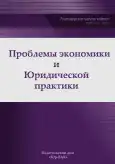Применение основных этапов аудита при оценке эффективности национальных проектов
- Авторы: Каширская Л.В.1, Зурнаджьянц Ю.А.2
-
Учреждения:
- ФГОБУ ВО «Финансовый университет при Правительстве Российской Федерации»
- Астраханский государственный медицинский университет
- Выпуск: Том 18, № 3 (2022)
- Страницы: 85-93
- Раздел: Статьи
- URL: https://journal-vniispk.ru/2541-8025/article/view/147101
- ID: 147101
Цитировать
Аннотация
Ключевые слова
Полный текст
Открыть статью на сайте журналаОб авторах
Людмила Васильевна Каширская
ФГОБУ ВО «Финансовый университет при Правительстве Российской Федерации»
Email: kashirskaya76@mail.ru
доктор экономических наук, профессор Департамента аудита и корпоративной отчетности Москва, Российская Федерация
Юлия Александровна Зурнаджьянц
Астраханский государственный медицинский университет
Email: julia.zur@yandex.ru
кандидат экономических наук, доцент; доцент кафедры «Экономики и управления здравоохранением с курсом последипломного образования» Астрахань, Российская Федерация
Список литературы
- Воробьев А. Е., Чекушина Т. В. Национальная экономическая безопасность России. Методология управления государственными долгами: моногр.; Издательство Российского Университета дружбы народов. -М., 2021. -420 c.
- Генкин, Б. М. Мотивация и организация эффективной работы (теория и практика): монография / Б. М. Генкин. - 2-е изд., испр. - Москва: Норма: ИНФРА-М, 2020. - 352 с.
- Григорьева Е. А. Институциональное обеспечение модернизации экономики как условие экономической безопасности: Монография; ИНФРА-М -М., 2020. -241 c.
- Методика аудиторской проверки: процедуры, советы, рекомендации: монография / Д. Ю. Самыгин, Н. Г. Барышников, А. А. Тусков [и др.]; под ред. Н. Г. Барышникова. -Москва: ИНФРА-М, 2020. 231 с.
- Суглобов, А. Е. Методическое обеспечение аудита организаций в условиях несостоятельности (банкротства): монография / А. Е. Суглобов, А. И. Воронцовас, Е. А. Орлова. -Москва: РИОР: ИНФРА-М, 2020. 173 с.
Дополнительные файлы








